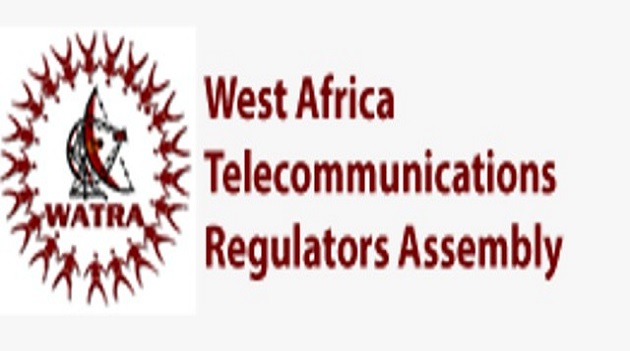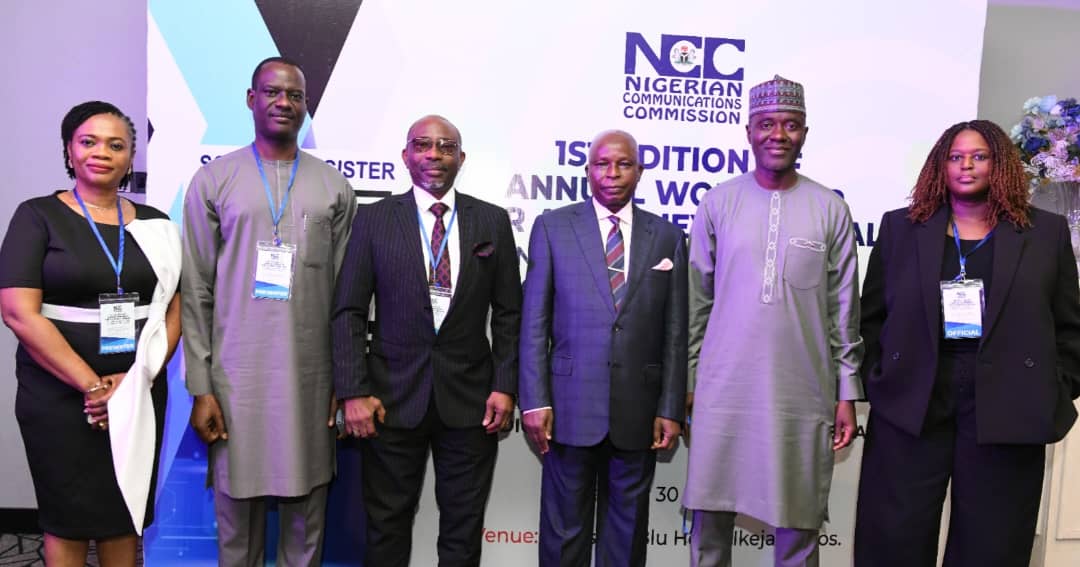Telecom
NCC Committed to Gender Equality in Information Technology Space

Professor Umar Danbatta, Executive Vice Chairman (EVC) of the Nigerian Communications Commission (NCC), has reiterated the Commission’s commitment to ensuring there is a balance in the representation of females in the information technology (IT) ecosystem.

The EVC, speaking recently through the Head, Digital Media Management of the Commission, Nafisa Usman Rugga, at the ICT Quiz competition for Girl’s in Senior Secondary Schools organized by Nigerian Women in Information Technology (NIWIIT), said there was an urgent need to equip the girl child with adequate knowledge, access and use of Information Technology programmes and services which will give them the needed skill to compete in the digital space.
Danbatta further stated that the empowerment programme in commemoration of the International Girls in ICT day, aligns with the Commission’s mandate of broadband penetration drive to women in rural and suburban areas for capacity building, employability, increased connectivity, and inclusion for gender equality throughout the Country.
The EVC also highlighted the Commission’s policies, projects and initiatives that show the importance of bridging gender disparity and ensuring that the Internet is a safe space for children. She laid emphasis on the Child Online Protection (COP) project of the Commission, which is aimed at educating children and their parents/caregivers on measures to safeguard themselves and their wards as they navigate cyberspace.
The CEO of NCC further informed the audience of the Commission’s commitment to re-skilling the girl child and women by collaborating with stakeholders in the ICT sector to create programmes to encourage, empower and expose them to the vast opportunities present in the digital world.
The two-day event which focused on creating awareness programmes for IT related services and products among women in the rural and suburban areas in Nigeria, targets special groups and students in secondary schools and tertiary institutions. The event ended with the presentation of gifts to the winners from the quiz competition conducted at the forum.
Telecom
Aliyu Aboki, WATRA Executive Secretary Champions Regulatory Harmonisation to Unlock West Africa’s Digital Economy

Mr. Aliyu Yusuf Aboki, executive secretary of the West Africa Telecommunications Regulators Assembly (WATRA), has reaffirmed the Assembly’s commitment to -promoting a harmonised digital policy and regulatory environment across West Africa—stating that consistent, coordinated regulation is key to unlocking investment, innovation, and growth in the region’s digital economy.

Speaking at the opening of the third meeting of WATRA’s Working Groups in Accra, Ghana, Mr. Aboki emphasised that a harmonised regulatory space would turn West Africa into a coherent, unified digital market attractive to global and regional investors.
“WATRA is not just facilitating dialogue—we are laying the foundation for a seamless regional market where innovation and investment can thrive,” said Mr. Aboki. “This meeting in Accra reflects our collective determination to build regulatory infrastructure that enables inclusion, trust, and scale.”
Hosted by Ghana’s National Communications Authority (NCA), the four-day high-level session brings together telecom regulators, private sector leaders, development partners, and digital policy experts to share knowledge and experiences and develop recommendations that will refine regional frameworks in three key areas: consumer experience, infrastructure development, and cybersecurity.
Why Harmonisation Creates a Larger Market
The ECOWAS region—home to over 400 million people—has immense potential as a single digital market. Yet divergent national regulations have led to fragmented investment environments, increased compliance costs, and inefficiencies in service delivery.
By aligning rules and standards across borders, harmonisation expands the effective size of the market available to telecom operators, fintechs, digital platforms, and infrastructure investors. Instead of dealing with 16 different licensing regimes, spectrum policies, or consumer regulations, companies can scale more efficiently across the region—reducing costs and risks while increasing innovation and competition.
“Regulatory harmonisation transforms fragmented national markets into one larger, more investable region,” Mr. Aboki explained. “It’s the gateway to building regional tech champions, improving affordability for consumers, and fostering resilient digital systems.”
Why the Working Groups Matter
WATRA’s Working Groups—on Consumer Access and Experience, Infrastructure Development, and Cybersecurity—are the Assembly’s strategic engines for technical cooperation and reform. Under Mr. Aboki’s leadership, they are designing regional frameworks that serve as models for national implementation.
- Consumer Access and Experience: Enhancing consumer trust and fair service standards increases uptake of digital services and drives inclusive digital participation.
- Infrastructure Development: Harmonised infrastructure policies—especially around spectrum allocation, satellite communications and sub-sea and terrestrial optical fibre—attract investment in broadband, towers, and regional connectivity.
- Cybersecurity: Establishing regional cyber standards is critical to protecting users, safeguarding cross-border digital trade, and ensuring investor confidence.
“The Working Groups produce actionable, home-grown solutions that regulators can adapt to national contexts,” Mr. Aboki said. “They are where vision meets implementation.”
A Sector of Strategic Importance
West Africa’s telecommunications industry is a cornerstone of the region’s economic development. With over 250 million mobile subscribers, more than 120 million internet users, and nearly 15% of Nigeria’s GDP coming from ICT, the sector plays a transformative role in commerce, education, governance, and job creation.
Yet, the absence of harmonised rules continues to impede regional scale. Mr. Aboki stressed that the creation of a Single Digital Market in West Africa could unlock billions of dollars in annual value, supporting seamless mobile roaming, digital financial inclusion, cross-border e-commerce, and regional cloud infrastructure.
A Vision for Regional Digital Transformation
The Accra meeting will finalise recommendations and technical outputs for validation and adoption at WATRA’s next Conference of Regulators. These outcomes are expected to serve as shared regional standards—improving regulatory consistency while respecting each country’s unique context.
Ghana’s Acting Director-General of the NCA, Edmund Yirenkyi Fianko, expressed support for the harmonisation effort, citing Ghana’s leadership in ECOWAS free roaming and regional cybersecurity frameworks.
Aliyu Aboki’s Strategic Leadership
Since taking office, Mr. Aboki has steered WATRA into a new era of proactive, consensus-driven regional leadership. His efforts are helping to position the Assembly as a continental thought leader in telecom and digital regulation—bridging national priorities with a unified regional vision.
“Regulation should be an accelerator of innovation, not a barrier,” Mr. Aboki concluded. “Through harmonisation, we can build a larger, safer, and more inclusive market that delivers real benefits to citizens, investors, and governments alike.”
Telecom
NCC and Attorneys-General Forge Powerful Alliance to Accelerate Nigeria’s Digital Transformation

Nigerian Communications Commission (NCC) has officially inaugurated its first-ever Annual Workshop for Attorneys-General, convening top legal officers from across Nigeria to strengthen regulatory collaboration and drive the nation’s digital agenda forward.

L-R: Head, Legal & Regulatory Services, Nigerian Communications Commission (NCC), Chizua Whyte; Chairman, Presidential Fiscal Policy and Tax Reforms Committee, Taiwo Oyedele; Attorney General of Lagos State, Lawal Pedro, SAN; Attorney General of the Federation and Minister of Justice, Lateef Fagbemi, SAN; Executive Vice Chairman/Chief Executive Officer, NCC, Dr Aminu Maida; and Executive Commissioner, Stakeholder Management, NCC, Barr. Rimini Makama, during the 1st edition of a two-day Annual Workshop for Attorneys General on Emerging Issues in the Communications Industry, hosted by the Commission which started in Lagos on Wednesday, July 30, 2025.
Opening the workshop at the Sheraton Hotel in Ikeja, Dr. Aminu Maida, Executive Vice Chairman/CEO of the NCC, emphasized the urgent need for strategic partnerships between the legal community and regulatory authorities.
“Collaboration is not optional—it is essential,” said Dr. Maida.
The workshop aims to catalyze reforms in the outdated Nigerian Communications Act of 2003, aligning regulatory frameworks with cutting-edge technologies and evolving consumer needs. Areas of focus include artificial intelligence governance, 5G infrastructure rollout, and stronger data protection protocols.
Delivering the keynote address, Attorney-General of the Federation and Minister of Justice, Chief Lateef Fagbemi, SAN, praised the NCC for initiating this impactful dialogue. He underscored the importance of legal clarity and enforcement in combating obstacles such as fragmented taxation, overlapping regulatory mandates, and infrastructure vandalism.
Citing notable setbacks—including the 2023 vandalism of base stations in Kano and the tax conflicts in Ogun State—Chief Fagbemi described these incidents as economic sabotage and called for unified legal responses.
He also spotlighted Anambra State’s Right-of-Way policy, which led to a 38% increase in fibre optic deployment, urging other states to emulate such progressive approaches.
A pivotal highlight of the workshop was the reaffirmation of telecom networks as Critical National Information Infrastructure (CNII), officially designated under President Bola Ahmed Tinubu’s 2024 Executive Order. This new status demands heightened protection and robust legal support.
The NCC announced that the workshop will become an annual platform for cross-governmental collaboration on emerging digital challenges, including cybersecurity, sustainable connectivity, consumer rights, and regulatory innovation.
As Nigeria positions itself at the forefront of Africa’s digital revolution, this unified effort by regulators and legal stakeholders marks a bold step in shaping an inclusive, resilient, and future-ready communications landscape.
Telecom
MTN Nigeria Hosts Inaugural Customer Engagement Day, Reaffirms Commitment to Customer-Centered Innovation

MTN Nigeria has held its first-ever Customer Engagement Day (CED) at its Rooftop venue in Ikoyi, Lagos, to deepen ties with its subscriber base and enhance customer experience.

The hybrid event, themed “We See You. We’re With You,” featured interactive sessions, tech demonstrations, and dialogue between MTN executives and customers, with over 80 million subscribers across Nigeria benefiting from digital engagement.
MTN Nigeria’s Chief Executive Officer, Dr Karl Toriola, in a fireside chat, said the company had transitioned from a service provider to a purpose-driven enabler.
“We’ve invested heavily to build a network that delivers value for money. While data remains among the most affordable globally, our priority is delivering quality and consistency. Today is about transparency: answering questions and listening to concerns,” Toriola said.
Also speaking, Mr Ayham Moussa, Chief Operating Officer, said MTN remained committed to supporting Nigerians.
“We started with people like you—entrepreneurs, engineers, everyday citizens. We connect over 80 million people today and aim to be a shield for homes and businesses,” he said.
The event featured speed mentorship sessions, a startup pitch challenge, tech lounges on MoMo PSB, and digital literacy trainings.
Mrs Ugonwa Nwoye, MTN Nigeria’s Chief Customer Relations & Experience Officer, highlighted the company’s data management efforts.
“We’re focused on smarter data usage and transparent practices. From parents streaming classes to small businesses on Zoom, we understand the realities and are acting on customer feedback,” Nwoye stated.
The day also saw engaging activities including gamified tech experiences, a digital skills academy and the “Pitch Your Solution” competition.
Closing the event, MTN Nigeria’s Chief Marketing Officer, Mrs Onyinye Ikenna-Emeka, restated the company’s commitment to integrating customer feedback into business decisions.
“We’ve listened and will act. From stories shared to ideas presented, today marks a shift from campaigns to meaningful collaboration,” she said.
The Customer Engagement Day forms part of MTN Nigeria’s broader initiative to evolve into a partner-in-progress for users, with plans to implement insights gleaned from the event.

 Telecom2 days ago
Telecom2 days agoGlo Boosts Network Capacity for Enhanced Customer Experience

 News2 days ago
News2 days agoTranscorp Power Posts Strong Half-Year Profit, Declares ₦11.25Bn Dividend

 E-Financial2 days ago
E-Financial2 days agoFG Asks Banks to Report Individuals with N25m Monthly Transactions to FIRS

 Telecom2 days ago
Telecom2 days agoNIMC Warns Nigerians Against Selling NIN Data Amid Rising Identity Fraud

 Telecom2 days ago
Telecom2 days agoMTN’s Uto Ukpanah Becomes 30th ICSAN President, Reinforcing Female Leadership in Governance

 E-Business2 days ago
E-Business2 days agoTemu Joins INTA to Combat Counterfeits and Elevate IP Standards Worldwide

 News2 days ago
News2 days agoInfraCredit, AMDA Sign Partnership to Unlock Local Financing for Africa’s Mini-grid Sector

 General News2 days ago
General News2 days agoFG Collaborates with China to Digitalize Customs



























